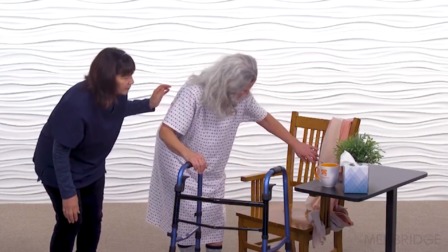Dementia Care: Reducing the Risk of Challenging Situations
Presented by Teepa Snow
12-Month Subscription
Unlimited access to:
- Thousands of CE Courses
- Patient Education
- Home Exercise Program
- And more
Non-Financial: Teepa Snow has no competing non-financial interests or relationships with regard to the content presented in this course.
This course will provide clinicians and direct care providers with a care planning approach and problem-solving strategy that reduces the risk that challenging behaviors or situations will arise. This happens when care providers are better at understanding the person, their history and needs, the changes the person living with dementia's (PLwDs) brain is experiencing, and the PLwDs efforts to communicate or express distress. The caregiver's ability to plan in advance and effectively and immediately respond to situations greatly reduces the risk that challenging behaviors and situations will occur.
Meet your instructor

Teepa Snow
Teepa Snow is an advocate for those living with dementia. She has made it her personal mission to help families and professionals better understand how it feels to be living with such challenges and seeks to change and improve life for everyone involved. Her practice has included everything from neuro intensive care units in…
Chapters & learning objectives

1. Reframing Problem Behaviors into Challenging Situations
This chapter will review some of the key symptoms of dementia & their relationship to problems in communication with caregivers, especially when there is distress or needs are not being met – frequently called challenging or difficult behaviors. The course will also demonstrate and discuss the role of the primitive brain in reacting to perceived threats, seeking to get needs met, and seeking pleasure or satisfaction in order to survive.

2. Building Your Skills
This chapter will demonstrate and explore the five most common expressions of distress from low to high level of expression when someone is NOT living with dementia and then when someone IS living with dementia – including similarities and differences. This chapter will also use demonstration and discussion to compare and contrast two people who are participating and how each might appear and behave if they had some form and degree of dementia and they perceived they were being threatened, were trying to get an unmet need met, or were seeking something pleasurable or satisfying, given their profile. Demonstrations include the use of care routines and timing modification, environmental modification, caregiver communication, and care skill modification and responsiveness to reduce the risk of challenging situations.

3. Problem Solving Distress
This chapter will use demonstration and discussion to explore problem solving within the context of caring for persons with some form and degree of dementia who perceived they were being threatened, were trying to get an unmet need met, or were seeking something pleasurable or satisfying, given their profile.

4. The Magic of a Sincere Apology
This chapter will use demonstration and discussion to demonstrate communication including sincere apologies as a strategy for working with persons experiencing some form and degree of dementia.

5. What You Know About Someone Makes a Difference
This chapter will review the importance and value in advance planning and modifications to meet the personal preferences and needs of the PLwD to reduce risk and minimize the impact of distressed behaviors on the person, the care provider, and those in the environment.
More courses in this series

Overview of Dementia: Alzheimer's, Vascular, Lewy Body, Frontotemporal
Teepa Snow

Dementia Care: Understanding Common Symptoms for Better Care
Teepa Snow

Dementia Care: Reducing the Risk of Challenging Situations
Teepa Snow

Dementia Care: Coping with Challenging Situations in Support & Care
Teepa Snow

Dementia Care: Using the GEMS States Model for Personal Care Tasks
Teepa Snow

Dementia Care: Communicating When Someone Has Dementia
Teepa Snow

Dementia Care: Offering Engagement for People Living With Dementia
Teepa Snow

Dementia Care: Helping as Abilities are Failing and Life is Ending
Teepa Snow